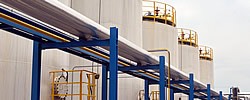Barring unforeseen setbacks, the American Petroleum Institute’s new heavy-duty engine oil categories, known as PC-11A and PC-11B, are back on track to launch in the marketplace next year – just as engine builders wanted – with a first licensing date of Dec. 1, 2016.
Previously, API’s Lubricants Group had cautioned that the new oils were falling behind schedule and might not be launched sooner than March 1, 2017. Oil marketers’ concerns revolved around the need to define the performance of two distinct categories (one compatible with existing engines, the other not), plus how to incorporate new base stocks and a unique SAE 10W-30 viscosity grade with higher high-temperature high-shear viscosity into their product lines. Viscosity grade read-across and base oil interchange guidelines were also lacking.
Countering this reluctance was the strong desire by the heavy-duty engine manufacturers to have the new oils in place in time to help them certify their 2017 model year engines to federal emissions and fuel economy standards. This meant that the challenge was great for all stakeholders.
The American Chemistry Council, which represents the additives industry, fortunately brought a proposal to break the logjam to the New Category Development Team, the inter-industry group of oil, additive and engine manufacturing associations who are responsible for hammering out heavy-duty oil specifications.
ACC’s proposal, offered in February, condensed a number of issues into a workable timeframe for API to begin licensing PC-11 oils by Dec. 1, 2016 -- but it hinged on meeting certain mileposts. One of these was that participants would have to agree by June 2015 on exactly which existing heavy-duty engine tests and chemical limits would be carried forward to PC-11.
At their meeting in late June in Ft. Lauderdale, Fla., ASTM’s Heavy-duty Engine Oil Classification Panel took care of that issue by doing an exit ballot and agreeing that the full slate of tests and chemical limits used in today’s API CJ-4 heavy-duty engine oils, should be picked up unchanged. Essentially, that “froze” the PC-11 category, making it feasible for API’s Lubricants Group to plan to ballot PC-11 for acceptance by Dec. 1, 2015. A one-year waiting period then would begin to assure a level playing field for candidate oils to be tested and licensed. Licensees’ first allowable use of the API donut trademark with the categories would come exactly one year later.
Based on plans laid out in the New Category Development Team and other discussions, Hind Abi-Akar of Caterpillar believes that there should be no roadblocks to having the first allowable use of API licenses in December 2016. The next key date is the Aug. 4, when NCDT will meet to propose the performance limits for PC-11’s two new engine sequence tests.
These are the Volvo T-13 test for bearing corrosion, oil oxidation and nitration, and the Caterpillar Engine Oil Aeration Test. Both have been accepted as ready for PC-11 testing, but category limits still must be set, tested and balloted before December 2015. At that time, PC-11A (which will be licensed as API CK-4) will be locked in concrete and everyone can work on product approvals. That would also kick off the 12-month process for oil marketers to secure their API licenses by the first-allowable-use date.
Oils meeting PC-11B, a fuel-saving specification tailored around the SAE 10W-30 viscosity grade, will be available on the same date and licensed as API FA-4. These will differ in their high-temperature, high-shear viscosity, proposed at 3.2 centiPoise, versus the 2.9 cP that SAE defines for conventional 10W-30 grades.
At issue here is whether FA-4 will be compatible with engines designed to use earlier oil categories. Officially no one is going to claim it, but some OEMs are saying that FA-4 oils might achieve limited compatibility with current CJ-4 oils -- but no further back. Interestingly, most North American OEMs use SAE 10W-30 as factory fill for their current engines.
Chevron’s Jim McGeehan, who steered seven categories through ASTM’s HDEO Classification Panel, has stated many times that its stakeholders are able to cooperate to develop specifications. “We’ve been very successful to deliver categories on time to meet OEM requirements,” he reminded Lube Report after the June meeting. So mark your calendar for Dec. 1, 2016, as first allowable use of API CK-4 and FA-4 licenses.
McGeehan retired from Chevron at the end of June, and from his decades-long chairmanship of the HDEOCP as well. The group has elected Shawn Whitacre, Chevron’s senior staff engineer, as its new chairman.



